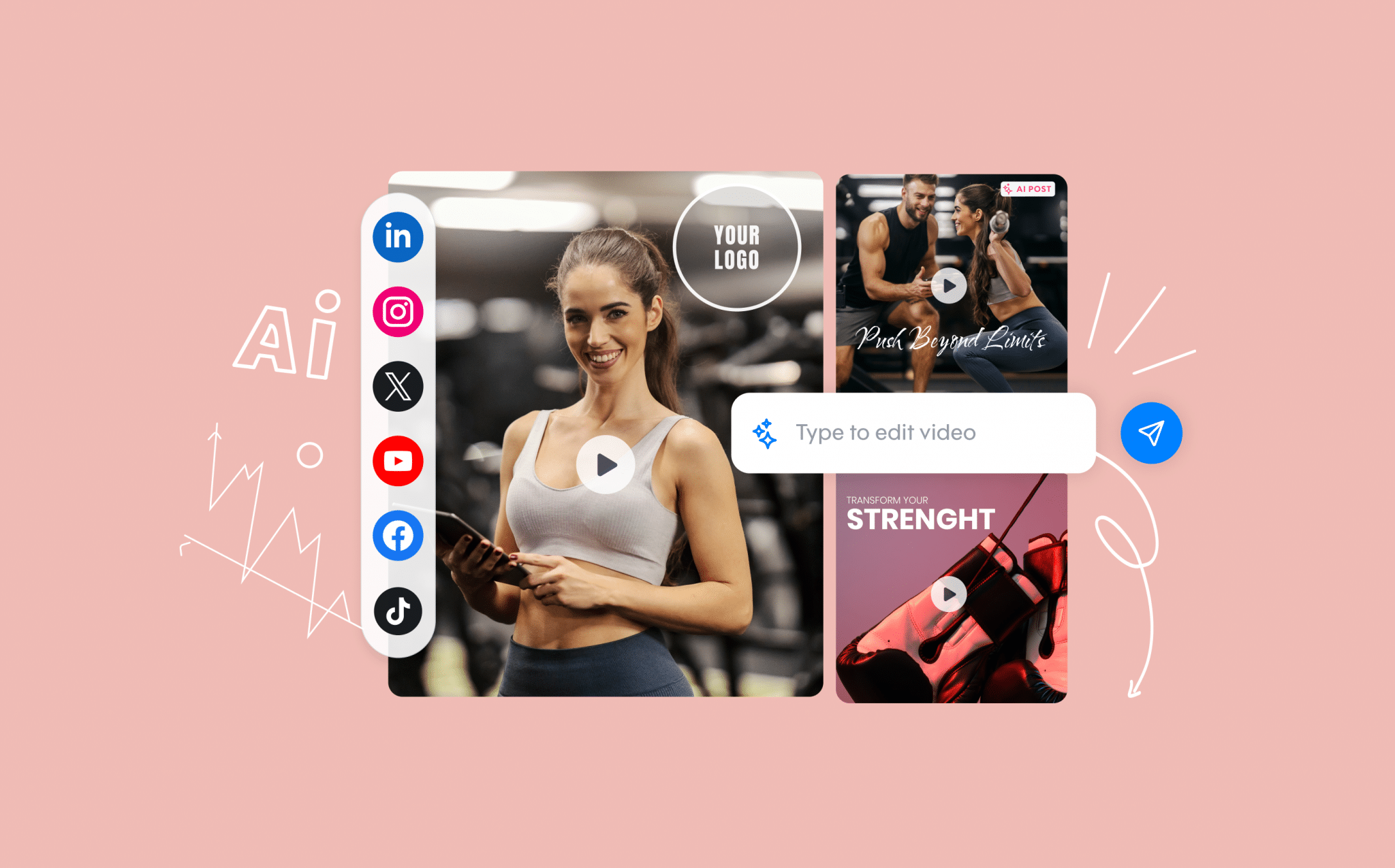
84% of Clients Want AI in Their Workouts: How Personal Trainers Can Stay Ahead in 2025

I technology continues to advance, personal trainers and fitness professionals are discovering new ways to use it to enhance their services, engage clients, and streamline their operations.
72% of fitness facility operators believe that AI will play a significant role in the industry’s future, while 84% of fitness consumers are interested in using AI to personalize their workout routines. This growing interest in AI presents a unique opportunity for personal trainers to leverage these technologies to improve client outcomes and expand their services.
In this blog, we’ll explore how AI can benefit personal trainers in all facets of their business from creating workout plans to marketing to managing clients and more. Whether you’re looking to optimize your business operations or deliver more customized training programs, AI can be a powerful tool in helping you achieve your goals.
The Rise of AI in the Fitness Industry
We’re currently watching AI rapidly reshape the fitness industry in real time, offering personal trainers and fitness professionals new ways to enhance their services, engage clients, and streamline operations. And it’s not just a tool for large companies; it’s a powerful ally that can elevate the quality of services offered while making business operations more efficient and effective, even for self-employed trainers and small business owners.
Here are some of the up-and-coming uses of AI technology reshaping the fitness industry:
- Personalized Workout Routines: AI analyzes client data such as fitness levels, goals, and preferences to generate tailored workout plans. This customization optimizes results and reduces the risk of injury, enabling trainers to deliver personalized programs efficiently.
- Virtual Personal Trainers and Coaching: AI-powered virtual trainers provide real-time guidance, feedback, and motivation during workouts. This technology allows trainers to offer flexible, accessible coaching to clients outside the gym, broadening their reach.
- Advanced Fitness Tracking: Wearable devices use AI to monitor vital signs, track activities, and analyze data on sleep, heart rate, and calories burned. Trainers can use these insights to adjust plans and provide data-driven advice.
- Gamification and Social Interaction: AI introduces gamified elements like challenges and virtual competitions, motivating clients to stay consistent. Social features on AI platforms foster community and healthy competition, enhancing client engagement.
- Injury Prevention and Rehabilitation: AI analyzes movement patterns to identify injury risks and offers personalized prevention strategies. In rehabilitation, AI-guided exercises help correct muscle imbalances and treat joint injuries, ensuring safer recovery.
Applications of AI for Personal Trainers
No matter what part of your business you want to optimize, AI offers a range of practical applications that can significantly enhance the services personal trainers provide, helping them maximize client outcomes, streamline operations, and stay competitive in the evolving fitness industry. Let’s take a look at how personal trainers can effectively utilize AI.
Marketing
AI is transforming how personal trainers market their services, particularly through social media. By utilizing AI, trainers can create engaging social media content and manage their online presence more effectively, helping them reach more people. AI tools can automate content creation, helping trainers generate eye-catching posts, videos, and ads that resonate with their target audience. This not only saves time but also ensures that the content remains consistent and aligned with the trainer’s brand.
Additionally, AI helps in analyzing social media performance, providing insights into what works and what doesn’t. By understanding engagement metrics, trainers can refine their marketing strategies, focusing on the types of content and platforms that yield the best results. This data-driven approach enables trainers to reach a wider audience and attract more clients.
Recommended Tools: PromoAI is an excellent AI tool that assists with social media marketing by generating, scheduling, and publishing personalized social media content to help trainers optimize their social media presence.
Personalized Workout Plans
As we discussed above, AI has revolutionized the way personal trainers create workout plans by analyzing client data, goals, and fitness levels to generate customized training programs. This technology allows trainers to efficiently design tailored routines that optimize results for each individual client, taking into account factors like strength, flexibility, and endurance. By leveraging AI, trainers can ensure that their clients receive personalized workout plans that are not only effective but also safe, minimizing the risk of injury.
Recommended Tools: Tools like Fitbod and FitnessAI use AI to create personalized workout plans, adapting to the user’s progress and changing needs over time. These platforms allow trainers to offer highly customized fitness programs that keep clients motivated and on track to achieve their goals.
Progress Tracking and Analysis
Monitoring client performance and tracking progress over time is an essential part of personal training, and AI tools can help you do it better and more accurately. These tools analyze data from various metrics, such as workout completion rates, strength gains, and endurance improvements, to provide trainers with a clear picture of their clients’ progress. By identifying patterns or areas for improvement using data-driven insights, trainers can make informed decisions about adjusting training programs to better meet their clients’ needs.
Data-driven decision-making enables trainers to customize workouts more precisely, ensuring that clients continue to progress and avoid plateaus. This approach not only enhances the effectiveness of training programs but also boosts client satisfaction by showing tangible results.
Recommended Tools: AI ML Programming uses AI to analyze data collected from fitness trackers, wearable devices, and other sources to provide insights into a person’s fitness and health, allowing trainers to monitor client performance closely and make necessary adjustments to their training plans.
Administrative Tasks
As a trainer, your expertise and passion lie in fitness, not calendars and emails. Yet these administrative tasks still take up valuable time and energy. Thankfully, AI is great at handling repetitive administrative work, such as scheduling, note-taking, and follow-up communications. By automating these tasks, AI allows personal trainers to focus more on direct client interaction and coaching, enhancing the quality of their services.
Automating administrative tasks frees up valuable time, enabling trainers to devote more energy to developing personalized workout plans, monitoring client progress, and providing real-time feedback. This increased focus on client engagement can lead to better outcomes and higher client satisfaction.
Recommended Tools: Tools like Motion and Clockwise automate appointment scheduling, while apps like Tactiq and WriteMail assist with note-taking and emails. These tools streamline the day-to-day administrative workload, allowing trainers to concentrate on what they do best—coaching and motivating their clients.
Expanded Knowledge Base
As you know, staying updated with the latest information and developments in the fitness field is an essential part of the personal training profession. AI helps by providing personal trainers with the ability to quickly access and synthesize vast amounts of fitness information, staying updated on the latest research, techniques, and trends in the industry. This access to an expanded knowledge base ensures that trainers can continuously improve their expertise and offer clients the most current and effective training methods.
With AI tools, trainers can stay informed about new workout techniques, nutritional advice, and scientific advancements in fitness, which they can then incorporate into their training programs. This ongoing education helps trainers deliver more informed and effective guidance, enhancing client results and satisfaction.
Recommended Tools: Platforms like Consensus and Elicit offer tools that help streamline the process of doing research, while AI-driven tools like ChatGPT can provide quick summaries and explanations of complex topics, helping trainers stay ahead of the curve in their field.
Enhanced Client Engagement
Client engagement is crucial in personal training, fostering motivation, accountability, and a strong trainer-client relationship, leading to better program adherence and improved fitness outcomes. AI platforms offer features like virtual coaching, real-time feedback, and motivational prompts that help keep clients engaged even between in-person sessions. These tools ensure that clients stay motivated, maintain consistency, and feel supported throughout their fitness journey, which can lead to better long-term results.
By providing continuous engagement, AI helps bridge the gap between training sessions, making clients feel connected and accountable. This consistent interaction can improve client retention and satisfaction.
Recommended Tools: Replika offers emotional support and motivation as well as daily check-ins, helping trainers maintain a strong connection with their clients outside of scheduled sessions.
Business Optimization
AI has become an essential tool for personal trainers looking to optimize their business operations and improve efficiency. By leveraging AI-driven tools, trainers can streamline various aspects of their business, from client management to financial analysis and operational efficiency.
AI can assist in managing client data more effectively, providing insights into client behaviors, preferences, and progress. This enables trainers to offer more personalized services and identify opportunities for upselling or additional services based on data-driven insights.
AI-powered financial tools can also help personal trainers manage their business finances more efficiently. These tools can analyze income and expenses, provide cash flow projections, and generate reports that offer insights into financial performance. By using AI, trainers can make informed decisions about pricing, expenses, and investments, leading to improved profitability and business growth.
Finally, AI can also help trainers allocate resources more efficiently by analyzing data on client demand, session popularity, and resource utilization. This allows trainers to focus on high-impact activities that drive business success and maximize their time and effort.
Recommended Tools: QuickBooks offers AI-driven financial analysis and reporting to help manage business finances effectively, Mindbody helps trainers manage client interactions and business operations seamlessly, and HubSpot CRM helps trainers track client interactions, manage data, and optimize client engagement strategies.
Injury Prevention
Advanced AI systems have the capability to analyze movement patterns and biometric data, allowing personal trainers to predict potential injury risks before they become serious issues. By using these insights, trainers can proactively adjust workout programs to ensure that clients maintain their progress while minimizing the risk of injury. This approach not only enhances the safety of training regimens but also builds greater trust with clients, as they feel more secure knowing that their well-being is being closely monitored.
Using AI for injury prevention allows trainers to design more effective and personalized programs, ultimately leading to better long-term fitness outcomes. By preventing injuries, clients can stay consistent with their training, avoiding the setbacks that often derail progress. This proactive strategy not only improves client satisfaction but also reinforces the trainer’s reputation for providing high-quality, attentive service.
Recommended Tools: DorsaVi is an excellent platform that offers these predictive capabilities, monitoring biomechanics and providing real-time insights, enabling trainers to tailor programs that minimize the risk of injury while optimizing performance.
Balancing AI and Human Touch
Before you get too excited and replace and integrate AI into every single facet of your business, let’s just touch on one important final point. While AI offers incredible advantages in personal training, it’s crucial to remember that it should supplement rather than replace the human elements that are at the core of effective training. Empathy, motivation, and hands-on guidance from human trainers are irreplaceable components of the training experience. These elements foster strong relationships, build trust, and inspire clients to push through challenges—areas where AI simply cannot replicate the human touch.
AI-generated insights provide valuable data and can streamline many aspects of training, but it’s the professional judgment of trainers that ensures these insights are applied in a way that meets each client’s unique needs. Trainers should use AI as a powerful tool to enhance their offerings, starting with AI-generated recommendations and then fine-tuning them based on their experience, intuition, and direct interaction with clients. This balanced approach allows trainers to deliver personalized, high-quality services that combine the best of both technology and human expertise.
The Future of Personal Training
The integration of AI into the fitness industry offers personal trainers unprecedented opportunities to enhance their services, streamline operations, and grow their businesses. By adopting AI technologies, you can provide more personalized workout plans, track client progress with greater accuracy, and engage clients in innovative ways.
However, while AI can greatly enhance efficiency and effectiveness, it’s essential to remember that the human touch remains irreplaceable. Trainers should use AI as a powerful tool to complement their expertise, starting with AI-generated insights and then applying their professional judgment to tailor these insights to meet each client’s unique needs. By balancing AI with the irreplaceable human connection, you can deliver exceptional services that foster strong client relationships and drive long-term success.
To elevate your marketing efforts and engage your clients more effectively, explore how PromoAI can help you create professional-quality content effortlessly.
Meet PromoAI
Generate a month worth of video content for your business in just one click!
About the author
Daisy Rogozinsky
Daisy Rogozinsky loves to use the written word to educate, entertain, and tell stories. If she's not writing content, she's writing poetry, music, and screenplays.


